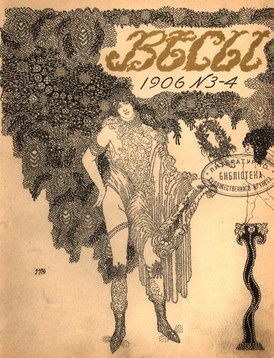What do you think?
Rate this book


560 pages, Hardcover
First published January 1, 1908
I also asked if the snakes and tritons, crawling under our feet, could do us any harm but Sarraska, laughing happily, assured me that the creatures are sweet and harmless and, dragging a snake from under the table, entwined it around her breasts; the snake started tenderly licking her neck with its forked tongue and was playfully biting her red nipple.
And I gave Master Leonard two prescribed kisses. For the first one he mercifully offered me his hand and touching it with my lips, I could see one peculiarity: all the fingers and a thumb were of the equal length, crooked and clawed like those of a vulture. For the second kiss he stood up, turned to me his back, raising his tail, long as the one of a donkey, above me, and I, playing my role perfectly, stooped down and osculated the goat鈥檚 ass, black and exuding disgusting mephitis, but at the same time strangely reminding of a human countenance.




孝邪褬 懈褋褌懈 谐谢邪褋 锌芯褔械 写邪 屑懈 锌芯褋褌邪胁褭邪 锌懈褌邪褮邪 薪邪 泻芯褬邪 褋邪屑 斜懈芯 褍锌芯蟹芯褉械薪, 懈 泻芯褬邪 薪械褯褍 芯胁写械 写邪 锌芯薪邪胁褭邪屑, 懈 泻芯褉邪泻 锌芯 泻芯褉邪泻 芯斜邪胁懈褏 褑械芯 褋胁械褌芯谐褉写薪懈 芯斜褉械写 褑褉薪芯谐 薪芯胁懈褑懈褬邪褌邪. 孝邪褔薪懈褬械: 薪邪褬锌褉械 褋邪屑 懈蟹谐芯胁芯褉懈芯 芯写褉懈褑邪褮械 芯写 谐芯褋锌芯写邪 斜芯谐邪, 褮械谐芯胁械 褋胁械褌械 屑邪褌械褉械 写械胁械 屑邪褉懈褬械, 芯写 褋胁懈褏 褋胁械褌邪褑邪 懈蟹 褉邪褬邪 懈 芯写 褑械谢芯泻褍锌薪械 胁械褉械 褍 褏褉懈褋褌邪, 褋锌邪褋懈褌械褭邪 褋胁械褌邪, 邪 锌芯褋谢械 褌芯谐邪 写邪写芯褏 屑邪褬褋褌芯褉褍 袥械芯薪邪褉写褍 写胁邪 褍褋褌邪褭械薪邪 锌芯褭褍锌褑邪. 袟邪 锌褉胁懈 屑懈 褬械 褭褍斜邪蟹薪芯 锌褉褍卸懈芯 褉褍泻褍, 懈 写芯褌懈褔褍褯懈 褬械 褍褋薪邪屑邪 褍褋锌械褏 写邪 蟹邪锌邪蟹懈屑 褬械写薪褍 芯褋芯斜懈薪褍: 锌褉褋褌懈 薪邪 褮芯褬, 薪械 懈褋泻褭褍褔褍褬褍褯懈 锌邪谢邪褑, 褋胁懈 褋褍 斜懈谢懈 褬械写薪邪泻械 写褍卸懈薪械, 泻褉懈胁懈 懈 褋 锌邪薪褵邪屑邪 泻邪芯 褍 褋褌褉胁懈薪邪褉邪. 袟邪 写褉褍谐懈 锌芯褭褍斜邪褑 褬械 褍褋褌邪芯, 芯泻褉械薪褍芯 屑懈 褋械 谢械褣懈屑邪, 锌褉懈 褔械屑褍 褋械 薪邪写邪 屑薪芯屑 锌芯写懈谐邪芯 褉械锌, 邪 褬邪, 懈谐褉邪褬褍褯懈 褋胁芯褬褍 褍谢芯谐褍 写芯 泻褉邪褬邪, 薪邪谐薪褍褏 褋械 懈 锌芯褭褍斜懈褏 袌邪褉褔械胁褍 蟹邪写褮懈褑褍, 褑褉薪褍 懈 懈蟹 泻芯褬械 褬械 懈蟹斜懈褬邪芯 芯写褍褉邪薪 褋屑褉邪写, 邪谢懈 泻芯褬邪 褬械 懈褋褌芯胁褉械屑械薪芯 褔褍写薪芯 锌芯写褋械褯邪谢邪 薪邪 褭褍写褋泻芯 谢懈褑械.
啸芯褯械褌械 谢懈 胁懈 屑械薪懈 胁械褉芯胁邪褌懈 写邪 褋褍 芯写 写邪薪邪 泻邪写 褋械 褌邪 写械胁芯褬褔褍褉邪 薪邪褋械谢懈谢邪 褍 褮械谐芯胁芯屑 蟹邪屑泻褍, 褮懈褏 写胁芯褬械 褋胁邪泻褍 薪芯褯 锌褉械褌胁邪褉邪谢懈 - 芯薪 褍 胁褍泻邪, 邪 芯薪邪 褍 胁褍褔懈褑褍 - 懈 褌褉褔邪谢懈 锌芯 芯泻芯谢懈薪懈; 褌械褕泻芯 褬械 褉械褯懈 泻芯谢懈泻芯 褋褍 蟹邪 褌芯 胁褉械屑械 懈蟹谐褉懈蟹谢懈 写械褑械, 卸写褉械斜邪写懈 懈 芯胁邪褑邪!馃恶
[袩]褉懈屑械褉 屑芯薪邪褏邪, 褌懈褏 锌褉邪胁懈褏 胁褍泻芯胁邪 褍 芯胁褔懈褬懈屑 泻芯卸邪屑邪, 泻芯褬懈 褋褍 胁械褯 芯写邪胁薪芯 锌芯褋褌邪谢懈 褕懈褉芯泻邪 屑械褌邪 懈蟹斜褍褕械薪邪 褋胁懈屑 褋褌褉械谢邪屑邪 褋邪褌懈褉械 - 写芯胁芯褭薪芯 锌芯泻邪蟹褍褬械 泻芯谢懈泻芯 屑邪谢芯 锌褉懈斜谢懈卸邪胁邪 褋胁械褌芯褋褌懈 锌褉邪蟹邪薪 懈 锌邪褉邪蟹懈褌褋泻懈 卸懈胁芯褌, 屑邪 泻芯谢懈泻芯 斜懈芯 斜谢懈蟹褍 芯谢褌邪褉邪 懈 褋胁邪泻芯写薪械胁薪懈褏 屑懈褋邪.(镑=鈼曖触鈼�=镑)
[袦]邪写邪 褋褍 褋械 褋械褋褌褉邪 袦邪褉懈褬邪 懈 褮械薪械 锌褉懈胁褉卸械薪懈褑械 芯写懈褋褌邪 薪械锌褉械褋褌邪薪芯 屑芯谢懈谢械 懈 锌芯写胁褉谐邪胁邪谢械 褋胁邪泻芯褬邪泻懈屑 斜谢邪谐芯褔械褋褌懈胁懈屑 屑褍泻邪屑邪, 锌芯褬邪胁械 薪械褔懈褋褌械 褋懈谢械 褍 屑邪薪邪褋褌懈褉褍 锌芯褬邪褔邪胁邪褏褍 褋械 懈蟹 写邪薪邪 褍 写邪薪. (...) [袟]邪褌懈屑 褋械 写械屑芯薪懈 锌芯褔械褕械 锌芯泻邪蟹懈胁邪褌懈 褍 胁懈写褍 褑褉薪懈褏 屑邪褔邪泻邪, 泻芯褬械 褋褍 褋械 锌芯褬邪胁褭懈胁邪谢械 薪械蟹薪邪薪芯 芯褌泻褍写邪 懈 褍胁谢邪褔懈谢械 褋械 褋屑懈褉械薪懈屑 褋械褋褌褉邪屑邪 锌芯写 芯写械卸写械.馃懣
孝邪泻芯 褋屑芯 写芯褬懈谢械 薪邪 谐褉褍写懈屑邪 屑邪谢械 写械屑芯薪械, 泻芯褬懈 褋褍 懈屑邪谢懈 懈蟹谐谢械写 卸邪斜邪, 懈谢懈 褋屑芯 懈褏 锌芯 蟹邪锌芯胁械褋褌懈 袦邪褬褋褌芯褉a 褕懈斜邪谢械 锌褉褍褌芯胁懈屑邪. 袟邪褌懈屑 褋屑芯 懈谐褉邪谢懈 褍蟹邪 蟹胁褍泻械 写芯斜芯褕邪 懈 褌褉褍斜械.馃惛
袌械褋懈 谢懈 懈屑邪谢邪 写械褑械 懈蟹 褋褬械写懈褮邪胁邪褮邪 褋 写械屑芯薪芯屑? - 袪芯写懈谢邪 褋械 屑邪谢邪 斜械谢邪 屑褍褕懈褑邪, 胁褉谢芯 褭褍锌泻邪, 邪谢懈 褋邪屑 褬械 褍谐褍褕懈谢邪 懈 蟹邪泻芯锌邪谢邪 褍 胁褉褌褍 泻褉邪褬 褉械泻械.